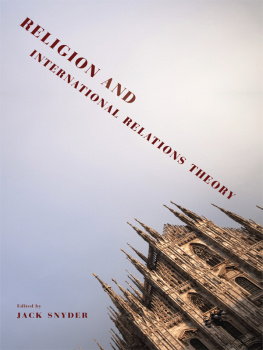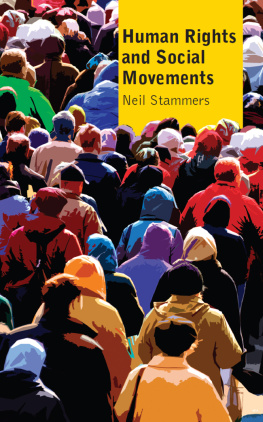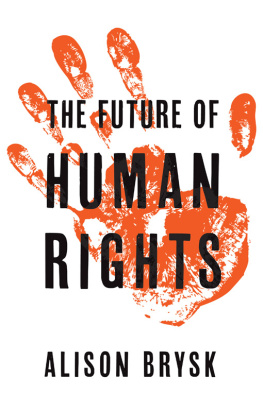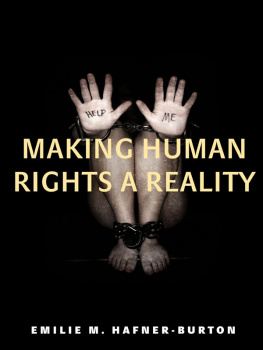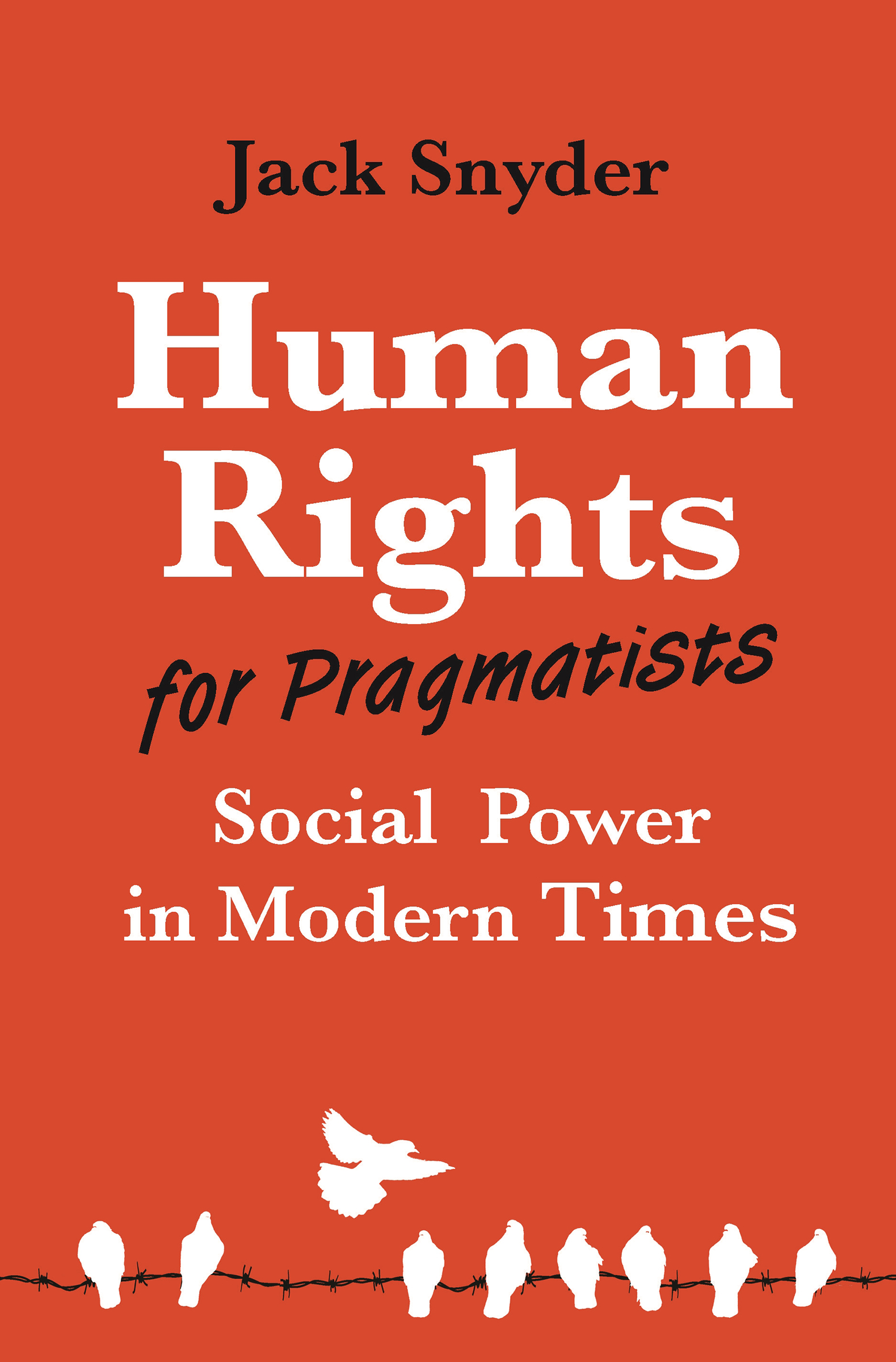HUMAN RIGHTS FOR PRAGMATISTS
HUMAN RIGHTS AND CRIMES AGAINST HUMANITY
Eric D. Weitz, Series Editor
Human Rights for Pragmatists: Social Power in Modern Times, Jack L. Snyder
Sharing Responsibility: The History and Future of Protection from Atrocities, Luke Glanville
A World Divided: The Global Struggle for Human Rights in the Age of Nation-States, Eric D. Weitz
The Crime of Aggression: The Quest for Justice in an Age of Drones, Cyberattacks, Insurgents, and Autocrats, Noah Weisbord
The Killing Season: A History of the Indonesian Massacres, 196566, Geoffrey B. Robinson
Evidence for Hope: Making Human Rights Work in the 21st Century, Kathryn Sikkink
They Can Live in the Desert but Nowhere Else: A History of the Armenian Genocide, Ronald Grigor Suny
Child Migration and Human Rights in a Global Age, Jacqueline Bhabha
The Young Turks Crime against Humanity: The Armenian Genocide and Ethnic Cleansing in the Ottoman Empire, Taner Akam
The International Human Rights Movement: A History, Aryeh Neier
All the Missing Souls: A Personal History of the War Crimes Tribunals, David Scheffer
Against Massacre: Humanitarian Interventions in the Ottoman Empire, 18151914, Davide Rodogno
Stalins Genocides, Norman M. Naimark
If You Leave Us Here, We Will Die: How Genocide Was Stopped in East Timor, Geoffrey B. Robinson
Terror in Chechnya: Russia and the Tragedy of Civilians in War, Emma Gilligan
Torture and the Twilight of Empire: From Algiers to Baghdad, Marnia Lazreg
PRINCETON STUDIES IN INTERNATIONAL HISTORY AND POLITICS
G. John Ikenberry, Marc Trachtenberg, William C. Wohlforth, and Keren Yarhi-Milo, Series Editors
Human Rights for Pragmatists: Social Power in Modern Times, Jack L. Snyder
Seeking the Bomb: Strategies of Nuclear Proliferation, Vipin Narang
The Spectre of War: International Communism and the Origins of World War II, Jonathan Haslam
Active Defense: Chinas Military Strategy since 1949, M. Taylor Fravel
Strategic Instincts: The Adaptive Advantages of Cognitive Biases in International Politics, Dominic D. P. Johnson
Divided Armies: Inequality and Battlefield Performance in Modern War, Jason Lyall
Active Defense: Chinas Military Strategy since 1949, M. Taylor Fravel
After Victory: Institutions, Strategic Restraint, and the Rebuilding of Order after Major Wars, New Edition, G. John Ikenberry
Cult of the Irrelevant: The Waning Influence of Social Science on National Security, Michael C. Desch
Secret Wars: Covert Conflict in International Politics, Austin Carson
Who Fights for Reputation: The Psychology of Leaders in International Conflict, Keren Yarhi-Milo
Aftershocks: Great Powers and Domestic Reforms in the Twentieth Century, Seva Gunitsky
Why Wilson Matters: The Origin of American Liberal Internationalism and Its Crisis Today, Tony Smith
Powerplay: The Origins of the American Alliance System in Asia, Victor D. Cha
Economic Interdependence and War, Dale C. Copeland
Knowing the Adversary: Leaders, Intelligence, and Assessment of Intentions in International Relations, Keren Yarhi-Milo
Nuclear Strategy in the Modern Era: Regional Powers and International Conflict, Vipin Narang
Human Rights for Pragmatists
SOCIAL POWER IN MODERN TIMES
JACK SNYDER
PRINCETON UNIVERSITY PRESS
PRINCETON & OXFORD
Copyright 2022 by Princeton University Press
Princeton University Press is committed to the protection of copyright and the intellectual property our authors entrust to us. Copyright promotes the progress and integrity of knowledge. Thank you for supporting free speech and the global exchange of ideas by purchasing an authorized edition of this book. If you wish to reproduce or distribute any part of it in any form, please obtain permission.
Requests for permission to reproduce material from this work should be sent to
Published by Princeton University Press
41 William Street, Princeton, New Jersey 08540
99 Banbury Road, Oxford OX2 6JX
press.princeton.edu
All Rights Reserved
ISBN 978-0-691-231549
ISBN (e-book) 978-0-691-231532
Version 1.0
British Library Cataloging-in-Publication Data is available
Editorial: Bridget Flannery-McCoy and Alena Chekanov
Jacket Design: Pamela L. Schnitter
Production: Erin Suydam
Publicity: Kate Hensley and James Schneider (US) and Kathryn Stevens (UK)
Copyeditor: Melanie Mallon
Jacket Art: Thomas Shanahan / iStock
CONTENTS
- ix
PREFACE AND ACKNOWLEDGMENTS
THE VIRTUES of human rights are commonly seen as self-evident and sacred. But sometimes the exercise of rights, even worthy ones, leads to disastrous outcomes. The constitutionally protected right to unfettered freedom of speech stoked a viral myth that the 2020 US presidential election had been stolen from Donald Trump, inciting an insurrection at the US Capitol. Religious rights are invoked to justify discrimination. Cultural rights are invoked to justify the abuse of women and children. Rights claims need to be evaluated in terms of their consequences.
In this book, I examine how human rights support a whole social system that sustains beneficial outcomes. Over the long haul, societies that generally comply with the principles laid out in the Universal Declaration of Human Rights achieve better outcomes in terms of social peace, political stability, and economic performance than societies that routinely violate those rights. Social systems based on human rights pass the pragmatic test of superior results.
This track record is a justification neither for complacency nor for anxious hand-wringing over occasional setbacks to the liberal rights project. At the end of the Cold War, when I began three decades of research on democratization and rights, it seemed that liberal democracy had decisively defeated the rival social systems of fascist nationalism and totalitarian communism. Triumphalism was in vogue. In that period my research could be called conditionally contrarian.
My coauthors Edward Mansfield, Karen Ballentine, and I warned that the absence of war among mature democracies did not mean that countries just beginning to experiment with competitive elections would necessarily be peaceful and rights respecting, especially if they lacked institutions of accountable government and a constructive marketplace of ideas. Later, my coauthor Dawn Brancati and I wrote about the danger of pushing for early postconflict elections before disarming belligerents and reforming administrative institutions.
A second conditionally contrarian project was a series of articles in the early 2000s on transitional justice with Leslie Vinjamuri. We questioned the untested claims that ending impunity by holding trials for perpetrators of atrocities would deter future crimes and strengthen the rule of law and democracy. We found that trade-offs between peace and justice were sometimes acute. In postconflict and postauthoritarian regimes where spoilers maintained significant power and legal systems were weak, trials almost never produced the outcomes that their proponents hoped for, and amnesty often fared better.
After the rise of illiberal populisms and authoritarian Chinese technocracy, conventional wisdom has flipped from liberal triumphalism to the fear that the liberal system is running out of steam. People have increasingly come to believe that the aspiration to spread democracy and human rights should be scaled back in resignation to a new game based on national interests and expedient deal making.


